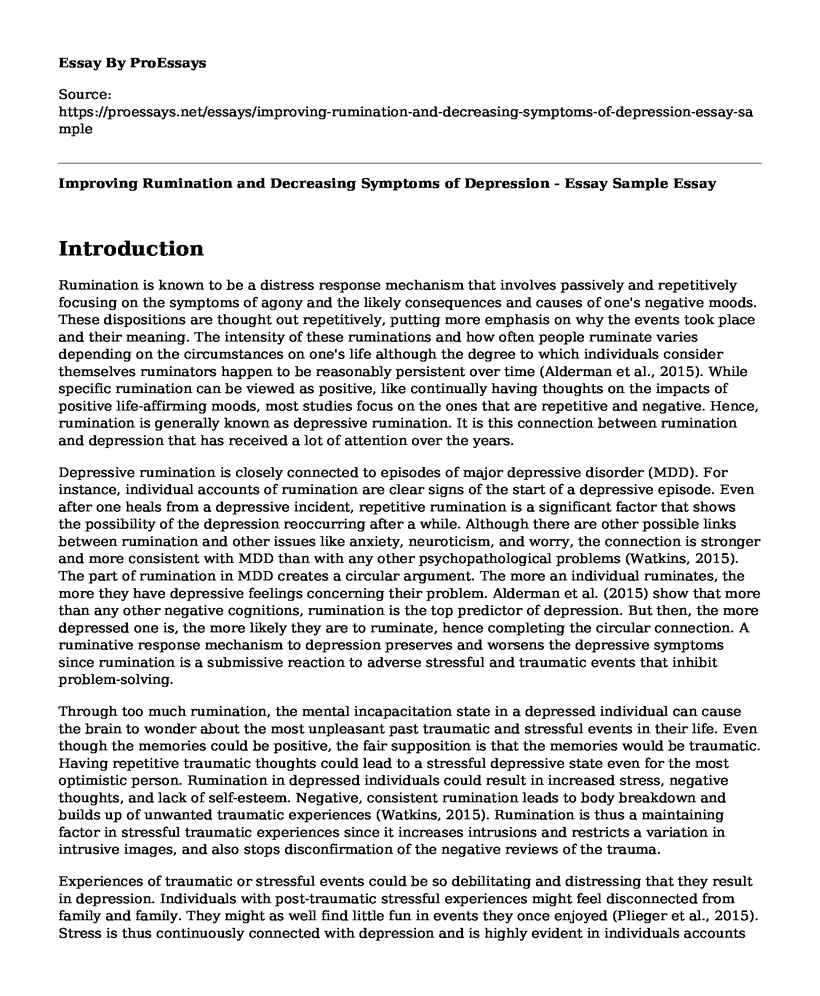Introduction
Rumination is known to be a distress response mechanism that involves passively and repetitively focusing on the symptoms of agony and the likely consequences and causes of one's negative moods. These dispositions are thought out repetitively, putting more emphasis on why the events took place and their meaning. The intensity of these ruminations and how often people ruminate varies depending on the circumstances on one's life although the degree to which individuals consider themselves ruminators happen to be reasonably persistent over time (Alderman et al., 2015). While specific rumination can be viewed as positive, like continually having thoughts on the impacts of positive life-affirming moods, most studies focus on the ones that are repetitive and negative. Hence, rumination is generally known as depressive rumination. It is this connection between rumination and depression that has received a lot of attention over the years.
Depressive rumination is closely connected to episodes of major depressive disorder (MDD). For instance, individual accounts of rumination are clear signs of the start of a depressive episode. Even after one heals from a depressive incident, repetitive rumination is a significant factor that shows the possibility of the depression reoccurring after a while. Although there are other possible links between rumination and other issues like anxiety, neuroticism, and worry, the connection is stronger and more consistent with MDD than with any other psychopathological problems (Watkins, 2015). The part of rumination in MDD creates a circular argument. The more an individual ruminates, the more they have depressive feelings concerning their problem. Alderman et al. (2015) show that more than any other negative cognitions, rumination is the top predictor of depression. But then, the more depressed one is, the more likely they are to ruminate, hence completing the circular connection. A ruminative response mechanism to depression preserves and worsens the depressive symptoms since rumination is a submissive reaction to adverse stressful and traumatic events that inhibit problem-solving.
Through too much rumination, the mental incapacitation state in a depressed individual can cause the brain to wonder about the most unpleasant past traumatic and stressful events in their life. Even though the memories could be positive, the fair supposition is that the memories would be traumatic. Having repetitive traumatic thoughts could lead to a stressful depressive state even for the most optimistic person. Rumination in depressed individuals could result in increased stress, negative thoughts, and lack of self-esteem. Negative, consistent rumination leads to body breakdown and builds up of unwanted traumatic experiences (Watkins, 2015). Rumination is thus a maintaining factor in stressful traumatic experiences since it increases intrusions and restricts a variation in intrusive images, and also stops disconfirmation of the negative reviews of the trauma.
Experiences of traumatic or stressful events could be so debilitating and distressing that they result in depression. Individuals with post-traumatic stressful experiences might feel disconnected from family and family. They might as well find little fun in events they once enjoyed (Plieger et al., 2015). Stress is thus continuously connected with depression and is highly evident in individuals accounts of specific traumatic life experiences like sexual abuse in childhood, chronic illnesses, loss of a loved one or a job, or divorce - the more an individual experiences stressful life events, the higher their likelihood of falling into a depression. Traumatic experiences are also known to be risk factors for suicide which is typically a symptom of MDD.
References
Alderman, B. L., Olson, R. L., Bates, M. E., Selby, E. A., Buckman, J. F., Brush, C. J., ... & Shors, T. J. (2015). Rumination in major depressive disorder is associated with impaired neural activation during conflict monitoring. Frontiers in human neuroscience, 9, 269. doi: 10.3389/fnhum.2015.00269
Plieger, T., Melchers, M., Montag, C., Meermann, R., & Reuter, M. (2015). Life stress as a potential risk factor for depression and burnout. Burnout Research, 2(1), 19-24. doi: 10.1016/j.burn.2015.03.001
Watkins, E. (2015). Psychological treatment of depressive rumination. Current Opinion in Psychology, 4, 32-36. doi: 10.1016/j.copsyc.2015.01.020
Cite this page
Improving Rumination and Decreasing Symptoms of Depression - Essay Sample. (2022, Dec 12). Retrieved from https://proessays.net/essays/improving-rumination-and-decreasing-symptoms-of-depression-essay-sample
If you are the original author of this essay and no longer wish to have it published on the ProEssays website, please click below to request its removal:
- Understanding and Controlling Teenage Suicide
- Research Paper on Sex Differences in Mental Abilities
- Paper Example on Organizational Stress: Examining Effects and Bar Graph Analysis
- Paper Example on Inclusion/Exclusion: PTSD & Sensitive Questions
- Essay Sample on Psychoanalytic Therapy: Unlocking Unconscious Influences to Improve Well-Being
- Unwind: Exploring Different Stress-Relief Practices Around the Globe - Essay Sample
- Mental Health: Causes, Types, and Management - Essay Sample







